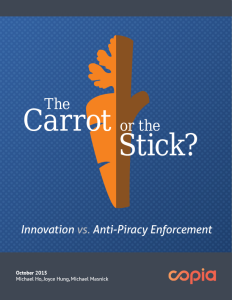Carrots and Sticks, Revisited
 Today the Copia Institute released a report entitled The Carrot or the Stick? Innovation vs. Anti-Piracy Enforcement. The idea of evaluating carrots, or incentives, versus sticks, meaning penalties, in the context of IP enforcement is a subject frequently explored here at DisCo [1] [2] [3]. In general, government policies tend to focus on sticks to the exclusion of carrots, even though the latter are a required component of any viable response to infringement. No amount of IP enforcement will increase lawful sales if consumers cannot find authorized, convenient online services in the marketplace which actually offer the content they are looking for. The Copia study compares innovation by new online services with anti-piracy laws in six different countries, and concludes that innovation in content delivery models is the best way to reduce infringement. Moreover, it enables new revenue streams.
Today the Copia Institute released a report entitled The Carrot or the Stick? Innovation vs. Anti-Piracy Enforcement. The idea of evaluating carrots, or incentives, versus sticks, meaning penalties, in the context of IP enforcement is a subject frequently explored here at DisCo [1] [2] [3]. In general, government policies tend to focus on sticks to the exclusion of carrots, even though the latter are a required component of any viable response to infringement. No amount of IP enforcement will increase lawful sales if consumers cannot find authorized, convenient online services in the marketplace which actually offer the content they are looking for. The Copia study compares innovation by new online services with anti-piracy laws in six different countries, and concludes that innovation in content delivery models is the best way to reduce infringement. Moreover, it enables new revenue streams.
The Copia report is very skeptical of the effectiveness of many “stick” strategies. Regardless of how effective any given “stick” strategy is, the report supports a conclusion that investing additional marginal dollars on “stick” strategies is likely to yield diminishing returns, particularly when compared to the potential return on the first dollar applied to an alternative “carrot” strategy.
Ultimately, the report underscores the trade-offs inherent in any policymaking activity. Given resource constraints, government resources must be allocated to produce the highest return toward achieving the goal in question, and in this context that means the largest amount of prevention. But due to opportunity costs, the trade-offs inherent in focusing solely on one strategy (anti-piracy) to the exclusion of others (promoting marketplace alternatives) is quite high. (Students of macroeconomics might recognize this as a form of production-possibility frontier). The result is that an all-stick and no-carrot distribution of enforcement resources turns out to be very inefficient.








